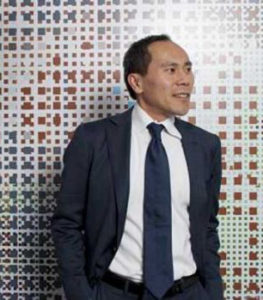Refugees get backing for business start-ups
A new initiative is promising to give refugees a leg up into to the world of small business.
The scheme, called Thrive, will give refugees microloans to start their own businesses.
The Westpac Bank is providing an interest-free loan facility worth $2 million as well as seconding an experienced staff member as chief operating officer to the organisation.

Huy Troung
Thrive will identify recipients, give them loans worth up to about $7,500 and provide mentoring to help newly arrived refugees start businesses.
The loans, for which Thrive will charge a 10 per cent interest rate, are intended to be paid back within three years and give those entrepreneurs a business and banking record upon which they can then apply for normal commercial loans.
The scheme is the brainchild of former Vietnamese refugee and now private equity investor Huy Truong and Allianz Australia chairman John Curtis and his wife Anna.
Mr Truong said the focus will be on services companies that allow refugees to start working straight away, provided they have the necessary equipment.
“There are certain service segments out there that just lend themselves to people who want to work hard,” he said.
“Things like domestic services like home cleaning, office cleaning, gardening … another one might be things like carpentry and cabinet making,” Mr Truong said.
“Years of experience have shown that refugees who are economically independent, integrate into their new country more quickly,” he said.
“Australia has a burgeoning service-based economy which provides abundant opportunities for self-motivated individuals to start their own business,” Mr Truong said.
Backers of the scheme also include former Boral chief executive Tony Berg, Simon Mordant and Luminis Partners and the Scanlon Foundation.
The organisation, which has been taking shape since March – getting its fundraising licence, charitable organisation licence and negotiating the Westpac agreement – aims to fill a gap in the market that Australia’s commercial banks don’t have the skills to meet, said Mr Curtis, a former Westpac deputy chairman.
“It’s quite difficult to get a new start,” he said.
“There’s all sorts of bureaucracy. We can provide people with an opportunity to get started.”
The organisation is weeks away from appointing a chief executive officer and it hopes to begin issuing loans in the first quarter of next year.
“We’re hopeful of being able to appoint someone in the next few weeks, with a view to them starting in around February/March 2017,” Mr Curtis said.
“Population growth, when well integrated, is a key driver of economic growth.
But it is a resource that needs to be tapped. The refugee issue is going to be growing bigger and bigger in the world. It’s not going to go away,” Mr Curtis said.
Laurie Nowell
AMES Australia Senior Journalist












